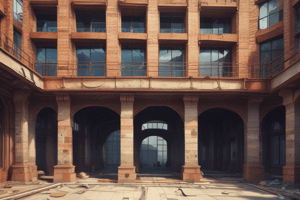Podcast
Questions and Answers
The _______________ of a structure is a crucial factor in its design.
The _______________ of a structure is a crucial factor in its design.
stability
A _______________ is a type of beam that is used to support a roof or floor.
A _______________ is a type of beam that is used to support a roof or floor.
lintel
The _______________ of a bridge is the uppermost part that supports the roadway.
The _______________ of a bridge is the uppermost part that supports the roadway.
beam
The process of creating a structure from the ground up is called _______________ construction.
The process of creating a structure from the ground up is called _______________ construction.
A _______________ is a type of arch that is wider than it is tall.
A _______________ is a type of arch that is wider than it is tall.
The _______________ of a material is its ability to withstand compression.
The _______________ of a material is its ability to withstand compression.
The _______________ of a structure is the point at which it is most likely to collapse.
The _______________ of a structure is the point at which it is most likely to collapse.
A _______________ is a type of wall that is used to retain soil or other materials.
A _______________ is a type of wall that is used to retain soil or other materials.
The _______________ of a building is the process of creating a detailed plan or design.
The _______________ of a building is the process of creating a detailed plan or design.
The _______________ of a structure is the study of its internal forces and loads.
The _______________ of a structure is the study of its internal forces and loads.
Flashcards are hidden until you start studying
Study Notes
Construction and Building Terms
- Abrade: wear away or rub off the surface of something
- Abrasion: the process of wearing away or rubbing off the surface of something
- Abrasive: having a rough or harsh quality that can wear away or rub off a surface
- Absolute volume: a measure of the total volume of a substance or material
- Acclivity: a upward slope or incline
Materials and Properties
- Acoustic insulation: the ability of a material to reduce the transmission of sound
- Acrylic: a type of plastic or synthetic material
- Adhesion: the ability of two substances to stick together
- Adhesive strength: the measure of how well two substances stick together
- Adiabatic: a process that occurs without the transfer of heat
- Adobe: a type of mud or earth-based building material
- Aerated concrete: a type of concrete that has air bubbles or pockets
- Aerocrete: a type of lightweight concrete
Structural Analysis and Design
- Allowable stress: the maximum amount of stress that a material can withstand without failing
- Analysis: the process of breaking down complex systems or structures into smaller parts to understand them
- Anchor bolt: a type of bolt used to secure structures or foundations
- Angle of friction: the angle at which an object begins to slide or move on a surface
- Axial force: a force that acts along the length of an object or structure
- Axial pressure: a force that acts along the length of an object or structure, causing compression
Construction and Building Techniques
- Air blown mortar: a type of mortar that is mixed and applied using compressed air
- Air compressor: a device that compresses air for use in construction or other applications
- Air permeability: the ability of a material to allow air to pass through it
- Air proof: a material or structure that is impermeable to air
- Backfill: the process of filling in a hole or excavation with soil or other materials
- Backfill concrete: a type of concrete used to fill in holes or excavations
- Bailer: a device used to remove water or other liquids from a hole or excavation
Building Components and Systems
- Balance: a state of equilibrium or stability in a structure or system
- Balance bar: a type of bar used to balance or stabilize a structure
- Balconet: a type of balcony or platform that projects from a building
- Balk: a type of beam or structural member
- Band chain: a type of chain or strap used to secure or hold objects together
Foundations and Earthwork
- Basement: a room or space below ground level in a building
- Bearing capacity: the ability of a soil or foundation to support a load or weight
- Bearing pile: a type of pile or foundation that transmits loads to the ground
- Bearing soil: the soil or material that supports a foundation or load
- Bending flexure: a type of deformation or stress that occurs in a structure or material
Civil Engineering and Buildings
- Bridge: a structure that spans a physical obstacle or gap
- Bridge crane: a type of crane used to lift or move heavy objects on a bridge
- Bridge pier: a type of support or column that holds up a bridge
- Bridge trust: a type of structural system or design used in bridges
- Brittle: a material that breaks or shatters when subjected to stress or force
- Buckling: a type of deformation or failure that occurs in a structure or material under compressive stress
Miscellaneous Terms
- Builder: a person or organization that constructs or builds structures or buildings
- Building code: a set of regulations or standards that govern building design and construction
- Building construction: the process of designing and building structures or buildings
- Building envelope: the outer layers or components of a building that provide protection and shelter
- Building regulations: a set of rules or laws that govern building design and construction
Studying That Suits You
Use AI to generate personalized quizzes and flashcards to suit your learning preferences.



